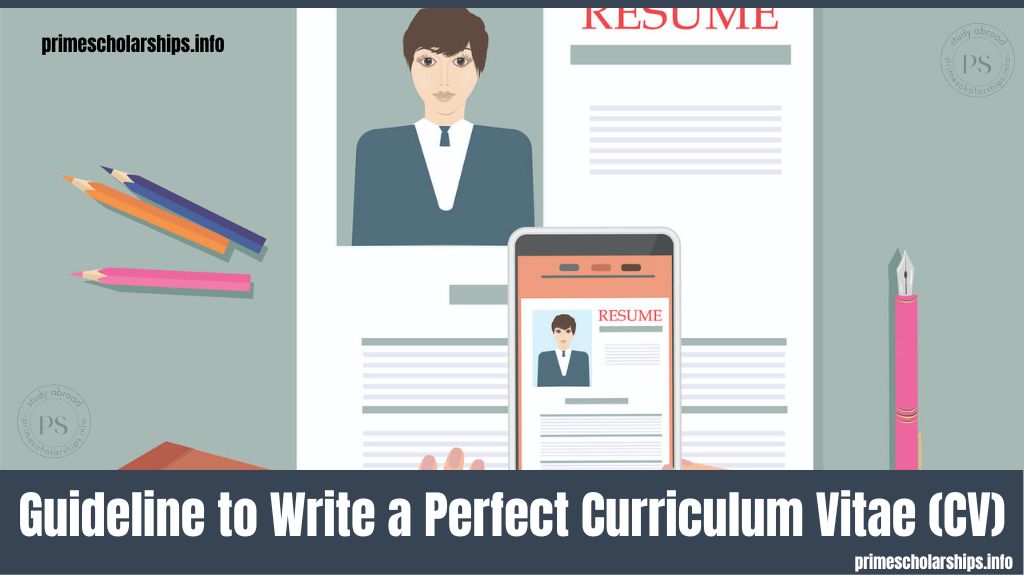Guideline to Write a Perfect Curriculum Vitae (CV): Writing an excellent Curriculum Vitae (CV) is crucial for proficiently presenting your abilities, credentials, and experiences to prospective employers. This is your opportunity to present your qualifications and experience to prospective employers and make a good first impression. But creating the ideal CV can feel stressful because there is so much contradicting information available. Do not get worried! With the help of this in-depth Guide, you will have all the information and resources necessary to create a curriculum vitae that really stands out.
Give priority on being concise and clear while writing your CV. Start with a well-organized, polished layout and choose a readable font. Make sure recruiters can easily contact you by providing them with your contact information. Emphasise the experiences that are most relevant to you and use action verbs to explain your successes. When feasible, quantify your accomplishments to show the influence you have had.
Check also: Mistakes to Avoid When Applying to University
What exactly is a Curriculum Vitae CV?
A curriculum vitae (CV) is the standard document used for job applications, academic positions, and numerous professional possibilities in many nations, especially in Europe, Asia, and Africa. Resumés and CVs are terms derived from the Latin “curriculum vitae,” which means “course of life.” Resumés tend to emphasise professional experience and brevity, however CVs and resumes can be used interchangeably. A Curriculum Vitae (CV) is a written document that offers a comprehensive overview of an individual’s training, work history, abilities, and other important qualifications.
CV Instruction and Format:
Guideline to Write a Perfect Curriculum Vitae (CV)
- Effective Overview: A CV need to be a brief yet powerful overview of your qualifications, background, and professional objectives. To show your impact, quantify your accomplishments using percentages or numbers.
- Personal Profile: Provide a brief description of your professional identity in your CV objective or summary, outlining your major qualifications and career aspirations.
- Skills: It Emphasise your abilities that are pertinent to the position you are seeking. Incorporate both soft skills (interpersonal skills) and hard skills. Make your talents section easier to scan by combining keywords and bullet points into one section.
- Education: List your degrees, institutions, and graduation dates to highlight your educational history. Provide a brief summary of your education, mentioning the school, the degree you received, and your area of specialisation. Include any relevant honours or certificates you may have.
- Additional areas: To give a complete picture of your qualifications, include any relevant categories such as achievements, languages, or certifications.
Guideline for writing an effective CV:
- Keep It Brief: Find a balance between being brief and including enough details to highlight your qualifications. One or two pages should be the maximum length for a CV, depending on your degree of experience. Stay clear of lengthy descriptions or adding unrelated material.
- Use active verbs: Give your resume vitality by using powerful, action-oriented verbs. Use impactful verbs to open each bullet point under “Work Experiences.”
- Ensure that it is up-to-date Make sure your resume is updated with all of your most recent accomplishments and experiences. Make sure that your credentials and experience align with your present position in the industry.
- Modify your CV: Avoid sending the same resume to every job. Spend some time modifying your resume for each job that you are looking for. Emphasise your experience and qualifications that best match the job requirements.
- Don’t lie or exaggerate: Keep your sincerity and honesty throughout your resume.
- Stay clear of enhancements or misleading information that might come to light throughout the employment process.
- Add a letter of cover: A strong cover letter can add personality to your application and boost your chances of being invited for an interview. In the cover letter, convey your excitement, outline your special skills, and show why you are a good fit for the position.
- Finally, Review your CV carefully for typos, grammatical mistakes, and inconsistent arrangement.



vurcazkircazpatliycaz.Vvlk9PHfAFj6
daktilogibigibi.OqwjioRxHhOM
daxktilogibigibi.S9R9LOtKOG2u
ascospore xyandanxvurulmus.qw5XmGEEbVhu
5afvff